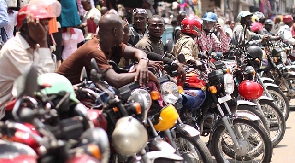The Centre for Social Democracy Ghana has made it known their support for the legalisation of the okada business as promised by the flagbearer of opposition National Democratic Congress (NDC) during one of his campaigns.
Even though it supports the legalization , the Organisation identified valid arguments against the move including non adherence to traffic regulations, blatant disregard of safety measures including non-wearing of helmets, the use of such medium by criminals to commit crime, and the high rate of motor bike related accidents which accounts for about 33% of road fatalities in the country have been raised by a section of the public.
Despite the fears, Centre for Social Democracy Ghana maintained that the legalisation and regulation of motor taxi would widen the tax net and has the potential to generate significant amount of revenue for government.
“The high rate unemployment resulting in social vices are likely to reduce drastically provided policy makers discuss dispassionately the proposal by the former President; H.E. John Mahama,” it stated.
Meanwhile, the organisation has drafted the required framework geared towards the legalisation and regulation of the Okada and Aboboyaa business.
Below is a statement:
LEGALIZATION OF OKADA AND ABOBOYAA (MOTOR TAXI)AUGUST30, 20201.
The Centre for Social Democracy Ghana has noted with keen interest the ensuing public debate following the Former President’s (H. E. John Mahama) policy pronouncement on the need to legalize and regulate the motor taxi business, commonly referred to as Okada if he wins the 7th December 2020 Presidential elections.
2.The Center for Social Democracy supports the legalization and regulation of Okada given its socio-economic benefits and the potential to augment government efforts to achieving Sustainable Development Goals (SDGs) 1, 2 and 8.
3.A sampled view of the arguments against the legalization of Okada include; non adherence to traffic regulations, blatant disregard of safety measures including non-wearingof helmets, the use of such medium by criminals to commit crime, and the high rate of motor bike related accidents which accounts for about 33% of road fatalities in the country.
4.The economically active youth between the ages of 18 and 40 are predominantly engaged in the Okada and Aboboyaa business across the 16 regions and 254 districts in the country.
The Okada and Aboboyaa business serves as the only source of livelihood for some graduates, students, school drop outs and individuals with no formal education. The Ghana Report in its recent release stated that the Association of Okada Riders has an estimated membership of over 800,000, which statistically constitute about 2.7% of Ghana’s population.
5.According to The Ghana Report, Jonathan Annan, a Senior Lecturer at KNUST in a study on road transport congestion management in 2017 suggested that Ghana loses about US$4.8 billion just by staying in traffic. Undoubtedly, the motor taxi has somewhat provided very fast and cheaper means of transport in both rural and urban areas.
6.The legalization and regulation of motor taxi would widen the tax net and has the potential to generate significant amount of revenue for government. The high rate unemployment resulting in social vices are likely to reduce drastically provided policy makers discuss dispassionately the proposal by the former President; H.E. John Mahama.
7.It must be noted that, motor taxi has existed in India since 1981 and is regulated to some extent. We suggest Ghana adopts, tried and tested regulatory practices from India and Rwanda as it builds consensus in the rollout of this viable policy.
8.The Center for Social Democracy recommends the following as the basis for drafting the required framework geared towards the legalization and regulation of the Okada and Aboboyaa business:
I.Formation of cooperatives to be recognized by government.
II.Compulsory registration in a recognized cooperative.
III.Compulsory wearing of helmet by both rider and passenger.IV.Continues education and training on traffic regulations and safety.
V.Bespoke insurance, investment and pension schemes for the sector.
VI.Fixed operating hours (5:00am to 7:00pm).
VII.Prescribed registration plate(color differentiation) and rider uniform.
VIII. Cap on registration, licensing and operation per district.
9.We are optimistic that legalizing and regulating the Okada and Aboboyaa business is timely policy worth pursuing as a nation.
General News of Monday, 31 August 2020
Source: atinkaonline.com

















